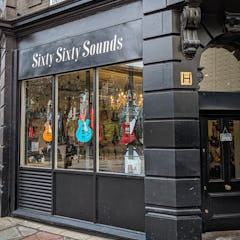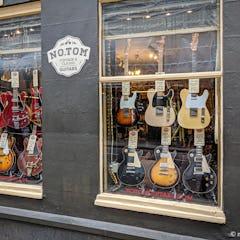One end of the street is on Charing Cross Road, making it easy to get to from the nearby Tottenham Court Road station.
History
Located in the West End, Denmark Street dates back to the 1690s. It was originally residential, but by the 20th century, it became more commercial. The name "Tin Pan Alley" originates from the American music publishing district in New York and was used to describe Denmark Street because of its significance in the British music industry.
By the 1950s and 60s, Denmark Street became the go-to place for music shops, publishers, and recording studios. Many aspiring musicians and songwriters visited the street, hoping to get their music published or to buy instruments.
Several iconic musicians and bands, including the Rolling Stones, Elton John, and the Kinks, have ties to Denmark Street. For instance, the Rolling Stones recorded their first album at Regent Sounds Studio, and The Kinks song “You Really Got Me” was recorded in one of the studios on the street. David Bowie, Jimi Hendrix, and many other music legends are also known to have frequented the street.
One of the most famous venues on the street was the 12 Bar Club, which hosted early performances by Adele, The Libertines, and many other artists. The venue was crucial in launching the careers of several musicians.
Nowadays
While many original music shops and venues have now closed or moved, Denmark Street retains a musical atmosphere, with guitar shops, small venues, and a few recording studios remaining. The street is a testament to London's vibrant musical history and remains a pilgrimage site for many music enthusiasts. If you're a fan of music history, Denmark Street is definitely a place to visit in London. The street is only 108m long, and visiting the guitar shops to support them while on a shopping trip on Oxford Street is easy. Some shops specialise in specific fields, like vintage and rare guitars, basses and amplifiers.





